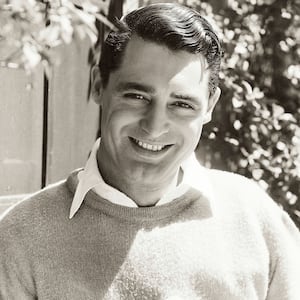Flying Over Sunset is, appropriately for its subject material, a strange trip of a musical—delightful in places, disconnected in others, and mainly a bore and downer. The real draw is that this Lincoln Center musical (to Feb 6, 2022) has Tony Yazbeck as Cary Grant dancing and tap-dancing alongside Atticus Ware as Cary Grant’s younger self. This is dancing, choreographed by Michelle Dorrance, as pure artistry.
The musical, directed by James Lapine, follows an imagined meeting in the late 1950’s between Cary Grant (Yazbeck), Aldous Huxley (Harry Hadden-Paton), and Clare Boothe Luce (Carmen Cusack), all tripping off their faces on LSD at Luce’s glamorous Malibu mansion as their respective trips lead them to confront old demons.
Apart from Yazbeck doing a second, wonderful dance routine, the drug-induced experiences lead to ponderous misery and self-examination. The trio hail their drug-taking as liberating and fun; it sure doesn’t seem that way watching this show. Instead, it just bears out the truth that there’s no worse trip than having to witness somebody else’s.
Alongside the three main characters is Gerald Heard (Robert Sella), the so-called godfather of the new age who was close to both Huxley and Luce and who serves as their their “guide” on their druggy self-exploration. But the play doesn’t explain Heard’s presence or character, and on stage Sella is kind of stuck and ancillary. It is strange that the play doesn’t outline who he is, because there are slabs that feel like copied-and-pasted Wikipedia entries as the characters reveal bits about their childhoods and various life markers and tragedies.
When details are not being clunkily imparted, the makers of the musical assume the audience knows what they know—so, shame on you unless you know the relevance of Dalton Trumbo, or Grant’s connection to Randolph Scott. Both are mentioned in passing, and both go unelaborated on.
The musical—with book by Lapine, music by Tom Kitt, and lyrics by Michael Korie—is titled by its sumptuously mounted lead song, as Luce recalls an experience on LSD that mimicked the sensation of flying around Los Angeles. It is weird: a song about drug-taking that sounds more like a lush, romance number.
We first see the characters separately. Huxley’s first trip, alongside wife Maria (Laura Shoop) and Gerald takes place in a drugstore, where he questions the naming of Mum deodorant, and the presence of hemorrhoid preparations. Here we first see the versatility of Beowulf Boritt’s stage design—an empty ampitheater that eventually takes on elements of a Malibu beach-house, a roiling sea, and even a film-set thanks to projections by 59 Projections.
The title song is key to what doesn’t work about the show. Carmen Cusack sings it beautifully, but it—and the show—can’t stop restating that this is about taking LSD. It’s one thing for a show to feature LSD taking as a gateway to character exploration, or something else, but just to have the act of taking drugs as the thing feels awfully like a person insisting they’re cool, they really are.

l to r: Tony Yazbeck, Harry Hadden-Paton, and Carmen Cusack in 'Flying Over Sunset.'
Joan MarcusOnly Yazbeck-as-Grant’s drug taking feels revelatory in this sense, and not just because of the fantastic dancing. His childhood as Archie Leech and his memories of his abusive father are genuinely affecting. Later, we see him whirl and feud and parry with Sophia Loren; and then we see him clad in a “penis rocket-ship” as his trip intensifies.
There is lightness and dark to his trip, a story, and a surreal flight of fancy. But, despite Haddon-Paton and Cusack’s performances, their characters’ stories are dreary, directionless, and repetitive; both are about grief—Huxley about the loss of his wife, Luce about the deaths of her daughter and mother—and neither manages to escape the overwrought narrative cul-de-sacs they end up in. Flying Over Sunset feels a little too graceful for the surreal mess of an LSD trip. Its best bits, as a company exercise, see the principals just being high and stupid as people on drugs are, not hearing each other, just lounging about being silly.
There is not, as one might expect, a profound connection forged among the people present. Each goes on their own individual trip around each other, but in private. What do we discover about them all that is compelling, surprising? Not much. The fact that there was a huge distance between Cary Grant the movie star and Cary Grant the person is hardly a surprise. Huxley and Luce both miss their loved ones, as we would expect them to.
There is barely an angry word said between them in two hours and forty minutes; instead, people repeat themselves about taking drugs, man, and getting stuck in their own stories. Sobering up, Gerald says Clare was rude to him when she was on her trip. Clare calls him as a pansy. And instead of really confronting of her about this, everyone talks everyone else off the ledge. She apologizes, but it’s a strange moment of conflict and unsatisfactory resolution that serves to remind the audience how denuded the show is of drama itself. Yazbeck’s dancing is a delight, but his dazzle cannot save us from a bad trip.







